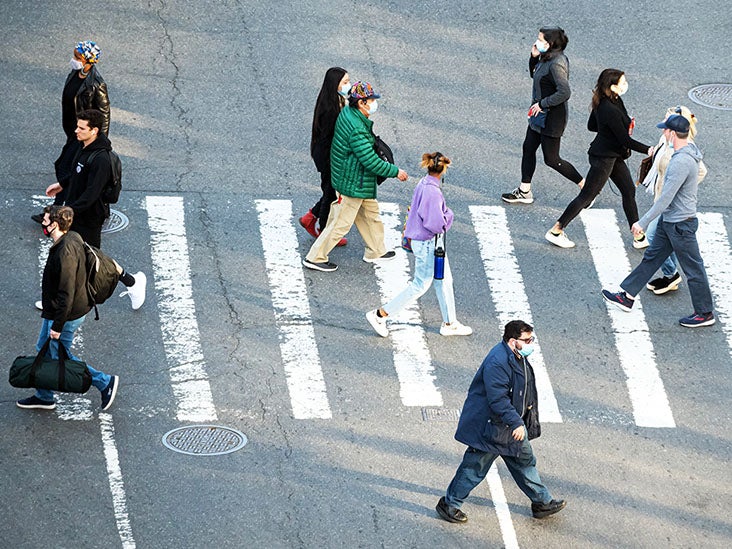
- Possessing COVID-19 need to confer some immunity from creating the disorder yet again, but health and fitness gurus do not know how extensive this immunity lasts.
- Scientists know that some folks have produced COVID-19 additional than when, but there are not plenty of knowledge for researchers to be ready to analyze how lengthy “natural” immunity lasts.
- Acquiring analyzed the genome of SARS-CoV-2, researchers counsel that, among unvaccinated people, reinfection could transpire as before long as 3 months soon after contracting the virus.
According to Our Globe in Data, approximately half of the world’s inhabitants have gained at least just one dose of the vaccine in opposition to SARS-CoV-2, the virus that leads to COVID-19.
At the starting of the pandemic, some jurisdictions, including people in the United Kingdom and Sweden, pursued a policy of herd immunity, which assumed that allowing adequate people today to catch the virus would confer plenty of immunity on the inhabitants to stop the pandemic.
Even though there have been some stories of folks developing COVID-19 additional than the moment, these figures are far too little to have out an epidemiological research. This indicates that it is hard to identify how extensive immunity conferred from a SARS-CoV-2 infection lasts.
In the current examine, researchers have done an evaluation of earlier released info on viruses comparable to SARS-CoV-2. They established out to decide how very long immunity following COVID-19 could possibly last.
The analysis, which seems in The Lancet Microbe, displays that unvaccinated people today can assume immunity versus reinfection to last 3–61 months after developing COVID-19 — if the virus is however circulating in the group.
This research could assistance really encourage men and women to get vaccinated, reported Dr. Ajay Sethi, associate professor of inhabitants wellness sciences at the University of Wisconsin-Madison, who was not associated in the research. He instructed Professional medical News Right now,
“The review underscores the value for the public to comprehend that immunity from all-natural an infection is not as lengthy long lasting as some may well understand, and unquestionably not lifelong.”
He also spelled out that “research has demonstrated that vaccination following all-natural an infection creates an even additional strong immune response as compared [with] vaccination with no any prior history of COVID-19. With any luck ,, additional people today who’ve had infection in the earlier will pick to get vaccinated.”
A staff from Yale University of General public Health and fitness in New Haven, CT, and the University of North Carolina at Charlotte seemed at the genes of 177 coronaviruses known to have an effect on human beings. The researchers then identified which have been the closest viral family of SARS-CoV-2.
They recognized 5 viruses that met this criterion. They incorporated SARS-CoV, responsible for the SARS outbreak in 2003, and MERS-CoV, which was initial detected in 2012. They also incorporated viruses that induce the widespread cold.
The scientists then analyzed existing info on how antibody levels decrease around time — from 128 times to 28 several years just after infection. They also seemed at the threat of reinfection at distinctive antibody degrees for those people viruses.
Applying this facts, they predicted that purely natural immunity conferred by contracting SARS-CoV-2 would probably past fewer than 50 {fe463f59fb70c5c01486843be1d66c13e664ed3ae921464fa884afebcc0ffe6c} as prolonged as the immunity due to contracting connected coronaviruses.
They uncovered that reinfection with SARS-CoV-2 in individuals who experienced not obtained a vaccine could arise as shortly as 3 months just after original infection, with a median chance of reinfection within just 16 months, underneath endemic circumstances.
Co-leader of the analyze Alex Dornburg, assistant professor of bioinformatics and genomics at the College of North Carolina, says:
“As new variants come up, prior immune responses come to be much less powerful at combating the virus. Those who were obviously infected early in the pandemic are increasingly possible to grow to be reinfected in the in close proximity to potential.”
The research authors conclude that as novel variants could evade current immunity, it is critical to concentration endeavours on accelerating worldwide vaccine packages to reduce the chance of variants emerging in the first position.
It is of notice that the review experienced particular limitations. For occasion, it did not search at how severity of preliminary SARS-CoV-2 infection or immune status of an personal could have an effect on how extended their natural immunity would past.
Talking on this level, Dr. Alexander Edwards, associate professor in biomedical know-how at the College of Studying in the U.K., who was not included in the review, instructed MNT:
“Reinfection is not really the important challenge for COVID-19. As an alternative, the most significant place is severity of an infection. If former infection shields from major sickness producing, it results in being fewer critical to the individual if they get infected a next time.”
“However,” he continued, “for COVID-19, we nonetheless never know if earlier an infection will entirely shield from extreme ailment and death for everybody.”
For reside updates on the hottest developments pertaining to the novel coronavirus and COVID-19, click on in this article.
